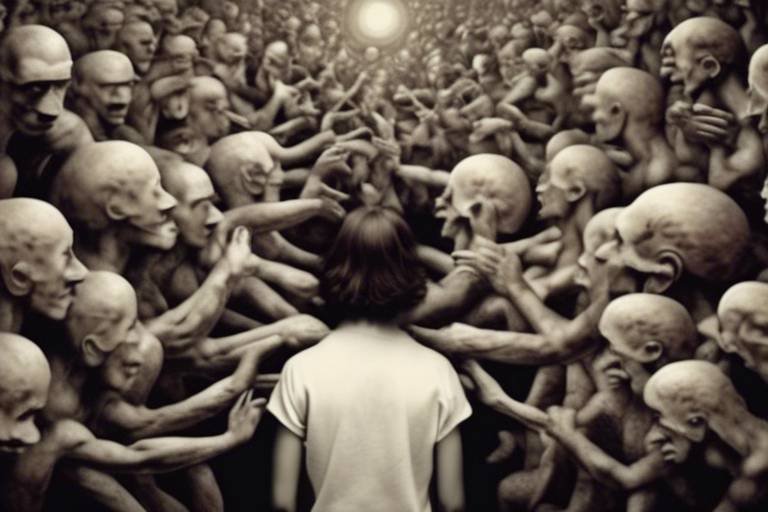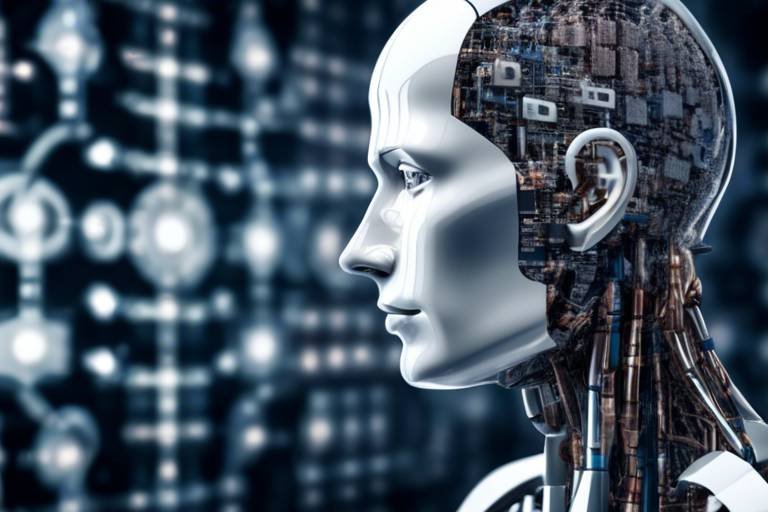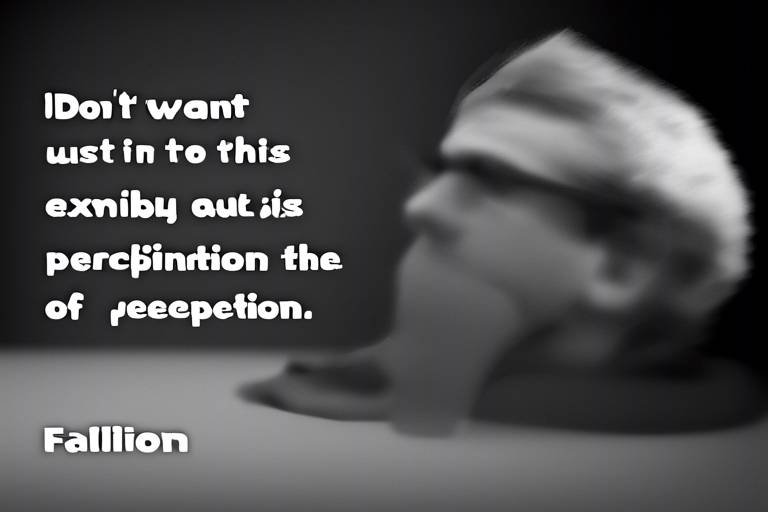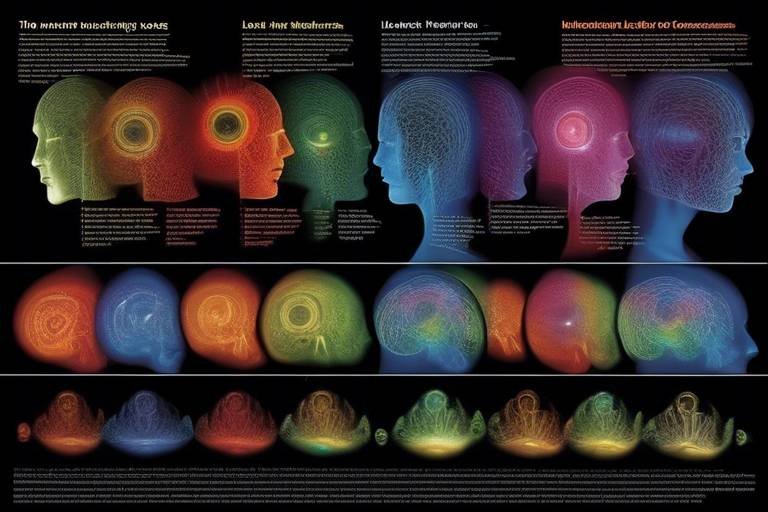Philosophy of Mind - How it Shapes Human Behavior
The philosophy of mind is a fascinating field that dives deep into the complexities of human consciousness and behavior. It’s like peeling an onion, where each layer reveals new insights about how we think, feel, and act. At its core, this discipline grapples with questions that have puzzled philosophers for centuries: What is consciousness? How do our thoughts relate to our physical bodies? And what makes us who we are? Through exploring these questions, we can better understand the intricate relationship between our mental states and our actions in the world.
Imagine for a moment that our minds are like a vast ocean, with consciousness being the surface waves that everyone can see. Below the surface, however, lies a rich and complex ecosystem of thoughts, beliefs, and emotions that drive our behavior. By examining these depths, we can uncover the underlying currents that influence our decisions and interactions. This exploration is not just an academic exercise; it has real-world implications for how we perceive ourselves and others, how we navigate relationships, and how we understand morality and free will.
As we journey through this article, we will delve into various theories that illuminate the philosophy of mind, such as dualism and physicalism, and how they shape our understanding of identity and selfhood. We will also explore the role of memory in constructing our sense of self, and how our past experiences can significantly influence our present behavior. Each of these elements plays a crucial role in the grand tapestry of human behavior, and understanding them can lead to profound insights about ourselves and our place in the world.
Ultimately, the philosophy of mind is not just about abstract concepts; it’s about the very essence of what it means to be human. It challenges us to think critically about our own experiences and the experiences of those around us. So, are you ready to dive into the depths of your own mind and explore how it shapes your behavior? Let’s embark on this intellectual adventure together!
- What is the philosophy of mind?
The philosophy of mind is a branch of philosophy that studies the nature of the mind, mental events, consciousness, and their relationship to the physical body.
- What is consciousness?
Consciousness refers to the state of being aware of and able to think about one's own existence, thoughts, and surroundings.
- How do dualism and physicalism differ?
Dualism posits that the mind and body are distinct entities, while physicalism argues that everything about the mind can be explained in terms of physical processes.
- What role does memory play in identity?
Memory is crucial for forming our identity, as it helps us recall past experiences that shape our beliefs, values, and behaviors.

Understanding Consciousness
Consciousness is a fascinating and complex topic that has intrigued philosophers, scientists, and curious minds alike for centuries. At its core, consciousness refers to our awareness of ourselves and our surroundings. It’s the internal dialogue that narrates our experiences, the lens through which we perceive reality, and the essence that makes us feel alive. But what exactly is consciousness? Is it merely a byproduct of brain activity, or is there something more profound at play?
There are various theories of consciousness that attempt to unravel its mysteries. One prominent theory is the biological perspective, which posits that consciousness arises from the physical processes of the brain. According to this view, our thoughts, emotions, and perceptions are all rooted in the neural connections and biochemical reactions occurring within our skulls. This perspective aligns with the scientific understanding of the mind as a product of the brain's intricate workings.
On the other hand, we have the philosophical perspective, which delves deeper into the nature of consciousness. Philosophers like René Descartes famously proclaimed, "I think, therefore I am," suggesting that the very act of thinking is proof of our existence. This leads us to ponder whether consciousness is a fundamental aspect of reality or simply an illusion crafted by our brains. The debate continues, with various schools of thought offering their insights.
One particularly intriguing aspect of consciousness is its influence on human behavior and decision-making. Our conscious thoughts often guide our actions, shaping our choices, relationships, and even our moral compass. For instance, when faced with a dilemma, our consciousness allows us to weigh the pros and cons, consider ethical implications, and ultimately make a decision that aligns with our values. This interplay between consciousness and behavior is a crucial area of study, as it can help us understand why we act the way we do.
Moreover, consciousness is not a static entity; it fluctuates and evolves based on various factors, including our experiences, emotions, and even our environment. For example, have you ever noticed how your mood can drastically alter your perspective on a situation? When you’re feeling happy, you might approach challenges with optimism, while sadness can cloud your judgment and lead to more negative interpretations. This dynamic nature of consciousness underscores its significance in shaping our behavior.
To further illustrate the relationship between consciousness and behavior, consider the following table that outlines different states of consciousness and their potential effects on human actions:
| State of Consciousness | Characteristics | Behavioral Implications |
|---|---|---|
| Awake | Fully alert, aware of surroundings | Active decision-making, problem-solving |
| Daydreaming | Partially focused, wandering thoughts | Reduced attention, creative thinking |
| Sleep | Unconscious state, body at rest | Restoration, memory consolidation |
| Altered States (e.g., meditation) | Heightened awareness, altered perception | Increased mindfulness, emotional regulation |
Understanding consciousness is essential not only for grasping what it means to be human but also for exploring the intricacies of our behavior. As we continue to investigate this profound subject, we inch closer to answering the age-old questions of existence, identity, and the essence of what it means to be alive. So, what do you think? Is consciousness merely a product of our brain's activity, or is there something deeper that we have yet to uncover?

The Mind-Body Problem
The mind-body problem is one of the most intriguing and persistent issues in the philosophy of mind. It revolves around understanding how our mental states—thoughts, feelings, and consciousness—interact with our physical bodies. Imagine your brain as a sophisticated control center, sending signals to your body to move, speak, or react. But what about the thoughts and emotions that come from within? How do they influence these physical actions? This complex relationship raises questions about the very essence of our existence and identity.
At the heart of the mind-body problem are two prominent theories: dualism and physicalism. Dualism posits that the mind and body are fundamentally different substances. Think of it like having a computer (the body) and the software (the mind) that runs on it. The software is intangible, yet it drives the computer's operations. On the other hand, physicalism argues that everything about the mind can be explained through physical processes in the brain. Here, the mind is viewed as an emergent property of the brain's complex interactions, much like how a symphony emerges from the cooperation of various instruments.
These contrasting views have profound implications for how we understand human behavior. For instance, if we subscribe to dualism, we might argue that our moral choices stem from a non-physical realm, suggesting a higher level of personal responsibility. However, if we lean towards physicalism, we may start to see our behaviors as products of biological processes, influenced by genetics and neurochemistry, which could challenge traditional notions of free will.
To dive deeper, let’s explore the nuances of dualism and physicalism. Dualists often highlight the subjective experience of consciousness—how it feels to be aware and to experience emotions. This perspective raises the question: if our thoughts and feelings are separate from our physical selves, how do they influence our actions? For example, consider a moment of intense fear; it can lead to a physical reaction, such as running away or freezing. Dualists argue that this connection is evidence of a distinct mind influencing the body.
Conversely, physicalists emphasize the role of the brain's structure and functions in shaping our thoughts and behaviors. They argue that mental states are directly correlated with brain activity. For instance, studies using brain imaging techniques have shown that certain thoughts and emotions activate specific areas of the brain. This suggests that our mental experiences are not separate from our physical bodies but are instead deeply intertwined. The implications here are significant, as they challenge the notion of an independent self and raise questions about the nature of personal identity.
Exploring dualism's implications, we find a rich tapestry of ideas related to morality, free will, and personal responsibility. If we accept that our mind exists independently of our body, we may feel empowered by the idea that our decisions are not strictly bound by physical limitations. This perspective can encourage a sense of agency in our actions, leading to a more profound understanding of moral accountability. However, it can also create a dichotomy where individuals might feel disconnected from their physical selves, leading to existential dilemmas about who they truly are.
On the flip side, physicalism offers a more grounded approach to understanding human behavior. By viewing mental disorders through the lens of neurobiology, we can better appreciate the complexities of mental health. For example, conditions such as depression or anxiety can be linked to chemical imbalances in the brain, emphasizing the need for medical intervention alongside psychological support. This perspective encourages a more compassionate approach to mental health, as it acknowledges that many behaviors are not simply choices but are influenced by biological factors beyond one’s control.
In summary, the mind-body problem remains a captivating area of exploration, pushing us to question the very nature of our existence. Whether we lean towards dualism or physicalism, the implications of these theories significantly shape our understanding of human behavior, identity, and the intricate dance between our minds and bodies.

Dualism vs. Physicalism
When it comes to understanding the mind, two prominent schools of thought emerge: dualism and physicalism. These theories offer contrasting views on the nature of the mind and its relationship to the body, which in turn significantly influences our understanding of human behavior. Dualism, often associated with philosophers like René Descartes, posits that the mind and body are fundamentally different substances. In other words, while the body is physical and can be observed and measured, the mind is non-physical, representing thoughts, emotions, and consciousness that cannot be quantified in the same way. This perspective raises intriguing questions about how these two distinct entities interact. For instance, how can something intangible like a thought influence a physical action, such as raising your hand?
On the flip side, we have physicalism, which argues that everything about the mind can be explained in terms of physical processes and brain activity. According to physicalists, mental states are nothing more than states of the brain. This perspective suggests that our thoughts, feelings, and decisions are ultimately the result of biochemical interactions and neural pathways. The implications of this view are profound. If our thoughts are merely products of physical processes, what does that mean for concepts like free will and moral responsibility? Are we simply biological machines, or is there something more to our existence?
To illustrate the key differences between these two theories, consider the following table:
| Aspect | Dualism | Physicalism |
|---|---|---|
| Nature of Mind | Non-physical substance | Physical processes |
| Interaction | Mind influences body | Brain states determine mind |
| Free Will | Supports the notion of free will | Challenges traditional views of free will |
| Implications for Morality | Emphasizes personal responsibility | Views moral behavior as influenced by biological factors |
As we dive deeper into these theories, it's essential to consider how they shape our understanding of human behavior. For example, dualism supports the idea that we have a soul or essence that transcends our physical existence, which can lead to a belief in moral accountability. Conversely, physicalism might suggest that our actions are predetermined by our biology, potentially leading to a more deterministic view of human behavior.
Ultimately, the debate between dualism and physicalism is not just an academic exercise; it has real-world implications for how we perceive ourselves and each other. Are we merely complex machines, or do we possess a unique essence that defines our humanity? As we explore these questions, we gain valuable insights into the nature of consciousness and the intricate tapestry of human behavior.

Implications of Dualism
Dualism, a concept that posits the existence of two distinct substances—the mental and the physical—has profound implications for our understanding of human behavior. Imagine for a moment that our minds are like a pilot navigating a plane; the body is the aircraft itself, and while the pilot can steer and make decisions, the aircraft operates based on physical laws. This analogy encapsulates the dualist perspective, suggesting that our mental states can influence our physical actions but are fundamentally separate from them.
One of the most significant implications of dualism lies in its approach to **morality**. If we accept that the mind and body are distinct, it opens the door to the idea that our moral decisions are not merely the result of biological impulses but are influenced by our mental states, including beliefs, desires, and intentions. This perspective encourages a more nuanced understanding of moral responsibility. For instance, if a person commits an act of violence, dualism allows us to consider not just the physical actions taken but also the mental processes that led to those actions. This leads us to ponder questions like: Are we morally culpable for actions that stem from mental illness?
Moreover, dualism contributes to the discourse on **free will**. If our minds are indeed separate from our bodies, then it implies that we have a certain degree of control over our actions that transcends mere physical causation. This notion can be empowering, as it suggests that individuals have the capacity to make choices that reflect their values and beliefs, rather than being mere products of their environment or biology. However, it also raises challenging questions about the extent of this freedom. For example, if our mental states can be influenced by external factors, to what degree are our choices truly our own?
Another critical aspect of dualism is its implications for **personal responsibility**. In a dualist framework, individuals might be held accountable for their actions, as these actions are seen as the result of conscious decisions made by the mind. This perspective can foster a sense of agency and accountability, encouraging individuals to reflect on their choices and the impact those choices have on others. However, it also necessitates a compassionate understanding of those whose mental states may impair their ability to make sound decisions. How do we balance personal responsibility with empathy for those struggling with mental health issues?
In summary, the implications of dualism extend far beyond mere philosophical debate; they permeate our understanding of morality, free will, and personal responsibility. By recognizing the intricate relationship between the mind and body, we can foster a more comprehensive approach to addressing the complexities of human behavior. As we navigate these profound questions, we must also consider how this dualistic view shapes our societal norms and legal systems, prompting us to rethink how we understand justice and accountability in a world where mental states play a pivotal role.
- What is dualism in the philosophy of mind? Dualism is the belief that the mind and body are two distinct entities that interact but are fundamentally different in nature.
- How does dualism affect our understanding of morality? Dualism allows us to consider moral responsibility as influenced by mental states, encouraging a more nuanced view of accountability.
- Can dualism coexist with scientific perspectives on behavior? Yes, many find ways to integrate dualist perspectives with scientific findings, acknowledging the complexity of human behavior.
- What are the criticisms of dualism? Critics argue that dualism fails to explain how the mind and body interact and may overlook the biological basis of behavior.

Implications of Physicalism
Physicalism, as a theory within the philosophy of mind, posits that everything about the mind can be explained in terms of physical processes and properties. This perspective has profound implications for our understanding of human behavior, particularly in how we perceive mental disorders and their treatments. Imagine for a moment that our thoughts, feelings, and actions are like a complex machine; if we can understand the gears and levers (the physical processes), we can better comprehend the entire system (human behavior).
One of the most significant implications of physicalism is its approach to mental disorders. Rather than viewing these conditions as purely psychological phenomena, physicalism encourages us to consider them as rooted in biological and neurological contexts. For example, conditions such as depression or anxiety can be seen as the result of chemical imbalances or structural anomalies in the brain. This understanding shifts the focus towards medical and therapeutic interventions, such as:
- Medication to correct chemical imbalances
- Therapies aimed at altering neurological pathways
- Behavioral interventions that modify physical responses
Moreover, this physicalist viewpoint challenges traditional notions of free will and personal responsibility. If our thoughts and actions can be traced back to physical states, to what extent are we truly in control of our choices? This question leads us into a philosophical quagmire, raising debates about moral accountability. For instance, if a person commits an act of violence due to a neurological disorder, can they be held fully responsible for their actions? This dilemma prompts a reevaluation of our legal and ethical systems, pushing us to consider how we define culpability in light of physicalist insights.
Additionally, physicalism opens the door to advancements in neuroscience, which has made significant strides in mapping brain activity to specific behaviors. Technologies like fMRI and EEG allow researchers to observe the brain in action, revealing how different areas light up during various mental tasks. This empirical approach not only deepens our understanding of cognition but also enhances our ability to predict and modify behaviors. As we learn more about the brain's workings, we can develop targeted interventions that can lead to better outcomes for individuals struggling with mental health issues.
In summary, physicalism reshapes our understanding of the mind and its relationship to behavior. By emphasizing the biological underpinnings of mental processes, it encourages a more holistic view of human experience. This perspective not only has implications for how we address mental health but also prompts critical discussions about free will, responsibility, and the very nature of identity itself. As we continue to explore these connections, we find ourselves at the intersection of philosophy, science, and ethics, where the implications of physicalism resonate deeply in our daily lives.
Q: What is physicalism?
A: Physicalism is the view that everything about the mind can be explained in terms of physical processes and properties, suggesting that mental states are ultimately rooted in physical states of the brain.
Q: How does physicalism affect our understanding of mental disorders?
A: Physicalism encourages a biological and neurological perspective on mental disorders, suggesting that they can often be treated through medical or therapeutic means that address underlying physical issues.
Q: Does physicalism challenge the concept of free will?
A: Yes, physicalism raises questions about free will by suggesting that if our thoughts and actions are determined by physical states, our control over our choices may be limited.
Q: What role does neuroscience play in physicalism?
A: Neuroscience plays a crucial role in physicalism by providing empirical evidence that links brain activity to mental states, helping us understand how physical processes influence behavior.

Emergent Properties of the Mind
The concept of emergent properties in the realm of the mind is a fascinating one. It suggests that our mental states arise from a complex interplay of simpler neurological processes, much like how a symphony emerges from the collaboration of individual musicians. Just as the beauty of music cannot be attributed solely to a single note, the richness of our thoughts, emotions, and behaviors cannot be reduced to isolated brain functions. Instead, these mental phenomena emerge from the intricate networks of neurons firing and interacting in ways that we are only beginning to understand.
To illustrate this, consider the analogy of a flock of birds. Individually, each bird follows simple rules, such as maintaining a certain distance from its neighbors and aligning its direction with nearby birds. However, when observed collectively, the flock exhibits complex behaviors, such as coordinated movements and intricate formations. Similarly, our minds operate on a foundation of basic neurological activities, yet these simple interactions culminate in the emergence of consciousness, creativity, and social behaviors.
Emergent properties can be categorized into several key aspects that significantly impact our behavior:
- Consciousness: The awareness of our thoughts and surroundings, which emerges from the collective activity of neurons.
- Emotions: Feelings that arise from the brain's processing of experiences, influencing our reactions and interactions.
- Thought Patterns: The way we think, reason, and solve problems is shaped by the complex interplay of neural connections.
- Social Behavior: Our ability to interact with others and form relationships is a product of emergent cognitive processes.
Understanding these emergent properties is crucial for grasping how they affect our daily lives. For instance, when we experience a moment of joy, it is not just a single neuron firing; rather, it is a symphony of brain activities that creates that feeling. This interconnectedness also sheds light on why mental health issues can arise when there are disruptions in these neural networks. Just like a malfunctioning instrument can throw off an entire orchestra, an imbalance in brain chemistry can lead to emotional and cognitive difficulties.
Moreover, recognizing the emergent nature of the mind encourages us to adopt a more holistic approach to mental health and well-being. Instead of merely treating symptoms, we can look at the broader picture—understanding how lifestyle, environment, and relationships contribute to our mental states. This perspective opens the door to more effective interventions, whether through therapy, medication, or lifestyle changes, all aimed at restoring harmony within the intricate web of our mental processes.
In conclusion, the emergent properties of the mind remind us that our mental lives are not merely the sum of their parts. They are complex, dynamic, and deeply intertwined with our experiences and interactions. As we continue to explore the mysteries of consciousness and cognition, we will undoubtedly uncover even more about how these properties shape our behaviors and define our identities.
- What are emergent properties? Emergent properties are complex traits or behaviors that arise from simpler interactions within a system, such as the brain.
- How do emergent properties influence behavior? They shape our emotions, thoughts, and social interactions, making our experiences richer and more nuanced.
- Can emergent properties change? Yes, they can change based on various factors, including experiences, environment, and mental health.
- Why is understanding emergent properties important? It helps us appreciate the complexity of the mind and informs better approaches to mental health and well-being.

Identity and Selfhood
When we think about identity and selfhood, it’s like peeling an onion, layer by layer, revealing the complex nature of who we are. At its core, identity is not just about our names or our roles in society; it encompasses our beliefs, values, experiences, and even our relationships. So, what really defines us? Is it our memories, our thoughts, or perhaps the way others perceive us? These questions have puzzled philosophers for ages, and they continue to shape our understanding of human behavior.
One fascinating aspect of identity is how it evolves over time. Just like a tree growing in different seasons, our identity can shift based on our experiences and the people we encounter. For instance, a person who has traveled the world may see themselves differently than someone who has lived in the same town their entire life. This evolution is not random; it's influenced by various factors, including cultural background, personal experiences, and even societal expectations. Moreover, the way we define ourselves can significantly impact our actions and decisions in life.
To delve deeper into this topic, let’s consider some philosophical theories of identity. These theories help us navigate the intricate web of what makes us who we are. Here are a couple of key theories:
- Psychological Continuity: This theory suggests that our identity is tied to our psychological experiences over time. Memories, personality traits, and consciousness play a pivotal role in maintaining our sense of self.
- Bodily Continuity: This perspective emphasizes the physical aspect of identity, arguing that our bodies are central to our identity. It raises questions about what happens to our identity if our bodies change, such as through injury or aging.
Both theories raise interesting implications for how we understand ourselves and our interactions with others. For instance, if our identity is primarily psychological, what happens when we forget crucial memories? Conversely, if our identity is tied to our physical form, how do we reconcile our sense of self with the inevitable changes that come with aging? These questions are not just academic; they resonate deeply in our everyday lives.
Another critical factor in shaping our identity is memory. Our memories are like a tapestry, weaving together the threads of our past experiences. They inform our decisions, influence our relationships, and even shape our aspirations. Have you ever met someone who seemed to have a completely different perspective on life because of their unique experiences? That’s the power of memory at play. It’s essential to recognize that our memories are not just static; they can change over time, influenced by our current emotions and beliefs.
As we navigate through life, our memories help us construct a coherent narrative of who we are. This narrative is not merely a collection of events; it’s a story that we tell ourselves and others. It affects how we perceive challenges, opportunities, and even our sense of belonging within a community. In essence, our memories shape our identity and, in turn, influence our behavior.
In conclusion, the concepts of identity and selfhood are intricate and multifaceted. They are influenced by a myriad of factors, from psychological continuity to the role of memory. Understanding these elements not only enriches our knowledge of human behavior but also invites us to reflect on our own identities. After all, who are we without our stories and experiences? As we continue to explore these themes, it’s essential to engage in conversations about identity, allowing us to appreciate the diverse perspectives that shape our world.
- What is the difference between identity and selfhood? Identity refers to the characteristics and qualities that define a person, while selfhood is more about the individual experience of being oneself.
- How do memories influence our identity? Memories help construct our personal narrative, shaping how we perceive ourselves and our place in the world.
- Can identity change over time? Absolutely! Identity is fluid and can evolve based on experiences, relationships, and personal growth.

Philosophical Theories of Identity
The concept of identity is one of the most profound and debated topics within the philosophy of mind. Philosophers have long sought to understand what it means to be the same person over time, despite the myriad changes we experience. At its core, the question revolves around how we define ourselves and what constitutes our identity. Is it our memories, our physical bodies, or perhaps our psychological continuity? Let's dive into some of the most prominent theories that attempt to unravel this complex puzzle.
One of the foundational theories of identity is the psychological continuity theory. This theory posits that personal identity is rooted in our psychological connections, particularly our memories and consciousness. According to this view, as long as there is a continuity of psychological experiences—like memories, thoughts, and personality traits—an individual remains the same person. Imagine a thread weaving through a tapestry; each memory and experience is a stitch that contributes to the overall picture of who we are. However, this theory raises intriguing questions: What happens if we lose our memories? Are we still the same person?
In contrast, the bodily continuity theory emphasizes the physical aspect of identity. This theory asserts that our identity is tied to our physical body; as long as our body remains the same, we are the same person. This perspective can be likened to a ship: if you replace every single plank of wood over time, is it still the same ship? Proponents of bodily continuity argue that our physical presence in the world plays a crucial role in defining our identity, regardless of the changes in our mental states.
Another fascinating approach is the Bundle Theory, famously articulated by philosopher David Hume. According to this theory, the self is nothing more than a collection of perceptions and experiences. Hume argued that we have no underlying essence; instead, our identity is just a bundle of different experiences that come together. Think of it like a movie montage: a series of clips that, when played together, create the illusion of a single narrative. This theory challenges the notion of a consistent self, suggesting that our identity is fluid and constantly evolving.
Moreover, there is the Transcendental Theory of Identity, which takes a more metaphysical approach. This theory suggests that there exists a fundamental essence or soul that transcends our physical and psychological states. Advocates of this view believe that our true identity is rooted in something beyond our tangible experiences, perhaps even linking to spiritual or religious beliefs. This perspective can be comforting, as it proposes that there is a core self that remains unchanged despite the chaos of life.
Each of these theories provides valuable insights into the nature of identity, yet they also come with their own sets of challenges and implications. For instance, the psychological continuity theory raises questions about the implications of memory loss, while the bodily continuity theory must contend with the reality of our bodies changing over time. The Bundle Theory challenges our understanding of selfhood, suggesting that we are more like a collection of experiences rather than a singular entity. Lastly, the Transcendental Theory opens up discussions about spirituality and the essence of being.
Ultimately, the exploration of these philosophical theories of identity not only helps us understand ourselves better but also influences our behavior and interactions with others. Our beliefs about identity shape how we view our responsibilities, relationships, and the very essence of who we are. As we navigate our lives, pondering these theories can lead to profound insights about our existence and our connections with the world around us.
- What is the main question regarding identity in philosophy?
The main question revolves around what constitutes personal identity over time and what factors contribute to our sense of self. - What is psychological continuity?
Psychological continuity refers to the idea that our identity is maintained through the continuity of our memories, thoughts, and consciousness. - How does bodily continuity differ from psychological continuity?
Bodily continuity emphasizes the physical body as the basis of identity, whereas psychological continuity focuses on mental states and experiences. - What is Bundle Theory?
Bundle Theory posits that the self is a collection of experiences and perceptions rather than a singular, unchanging essence. - Can identity change over time?
Yes, identity can change due to various factors such as experiences, memories, and even physical changes in the body.

The Role of Memory
Memory is not just a dusty old filing cabinet where we store our past experiences; it’s the vibrant tapestry that weaves together our sense of self. Imagine walking through a museum filled with paintings that represent every moment of your life. Each brushstroke, each color, tells a story that shapes who you are today. Memory influences our decisions, our actions, and even our interactions with others. It’s fascinating to think about how our memories can evoke emotions, trigger nostalgia, or even instill fear. Have you ever felt a rush of happiness just by recalling a cherished moment? That’s the power of memory at work!
To understand the role of memory in shaping our identity, we need to consider several key aspects:
- Personal Experiences: Every experience we have is etched into our memory, influencing our behavior and choices. For instance, a person who has faced rejection might approach new relationships with caution, while someone who has experienced unconditional love may be more open and trusting.
- Learning and Adaptation: Memory allows us to learn from our past. When we remember the consequences of our actions, we adapt our future behavior accordingly. Think of it as a personal GPS guiding us through the complexities of life.
- Social Connections: Our memories also play a crucial role in how we relate to others. Shared memories with friends and family strengthen bonds, creating a sense of belonging and community. Have you ever laughed with a friend over a funny incident from your past? Those shared memories are the glue that holds relationships together.
Moreover, the science of memory reveals that it’s not just a straightforward recording of events. Our memories are often reconstructed rather than replayed, meaning they can change over time. This malleability can lead to the phenomenon known as false memories, where we believe we remember something that never actually happened. This raises intriguing questions about the reliability of our memories and how they shape our identity. Are we truly the sum of our memories, or are we something more?
In the realm of psychology, memory is often categorized into different types, such as short-term, long-term, explicit, and implicit memory. Each type plays a distinct role in how we navigate our lives. For instance, explicit memory allows us to consciously recall facts and events, while implicit memory influences our behavior without us even realizing it, like riding a bike or tying our shoes. This duality highlights the complexity of memory and its profound impact on our daily actions.
As we delve deeper into the philosophy of mind, it becomes clear that memory is not just a passive repository of past experiences; it actively shapes our present and future. Our identities are fluid, influenced by the memories we cherish and those we wish to forget. In a world where change is the only constant, our memories serve as both anchors and sails, guiding us through the tumultuous waters of life.
- How does memory affect decision-making? Memory plays a crucial role in decision-making by allowing us to recall past experiences and their outcomes, helping us to make informed choices in the present.
- Can memories change over time? Yes, memories can be reconstructed and altered over time, leading to the possibility of false memories, which can affect our perception of reality.
- What are the different types of memory? The main types of memory include short-term memory, long-term memory, explicit memory (conscious recall), and implicit memory (unconscious influence).
Frequently Asked Questions
- What is consciousness in the context of the philosophy of mind?
Consciousness refers to the state of being aware of and able to think about one's own existence, thoughts, and surroundings. In the philosophy of mind, it is a central concept that explores how awareness influences human behavior and decision-making.
- What is the mind-body problem?
The mind-body problem is a philosophical question regarding the relationship between mental states (like thoughts and feelings) and physical processes (like brain activity). It raises essential questions about how our mental experiences relate to our physical bodies.
- How do dualism and physicalism differ?
Dualism posits that the mind and body are fundamentally different substances, while physicalism argues that everything about the mind can be explained in terms of physical processes. These differing views significantly influence how we understand human actions and experiences.
- What are the implications of dualism for human behavior?
Dualism suggests that our mental states can exist independently of our physical states, which impacts our understanding of morality, free will, and personal responsibility. This perspective can lead to the belief that individuals have a soul that governs their actions.
- How does physicalism affect our understanding of mental disorders?
Physicalism emphasizes that mental disorders are rooted in biological processes. This view can influence treatment approaches, focusing on neurobiological factors that affect behavior, thereby promoting a more scientific understanding of mental health.
- What are emergent properties of the mind?
Emergent properties refer to complex mental states that arise from simpler neurological processes. This concept highlights how intricate behaviors and thoughts can develop from basic brain functions, impacting our interactions and experiences.
- How does personal identity relate to the philosophy of mind?
Personal identity involves understanding what makes someone the same person over time. Within the philosophy of mind, this concept is explored through various theories, examining how our thoughts, memories, and experiences shape our identity and influence our actions.
- What role does memory play in shaping identity?
Memory is crucial in forming our identity, as it influences our decisions and actions. Our recollections of past experiences help define who we are, guiding our behavior in the present and future.



















